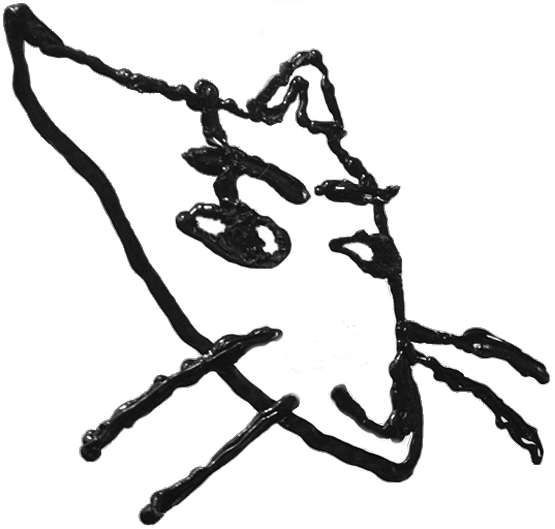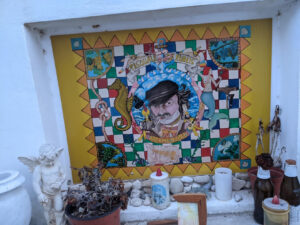
Mouse Magazine started in order to put in one place the work of all the strange people we knew. Directly or indirectly involved are the following: a member of a direct action collective who planned a firework show at the local jail, an anarchist who maintains a physical map collection for a large university, members of a defunct conservative Christian reading group, a few members of Platypus (an abrasive, international Marxist reading group), a sometime Maoist sympathizer turned Quaker, an itinerant pedagogue, and various lazy working stiffs who spend their time abandoning obligations to write songs in their cars, steal honey, leave books in public bathrooms, and write poems in between paid-by-the-word copy for podiatry clinics and standardized test companies. These were the people who got together to produce the first issue of Mouse: a collection of reviews, essays, poetry, translations, fiction, visual and video art, and snippets of reportage from around the world.
By no one’s design, a theme emerged in this first issue, most visibly in the essays by Fen Inman, Cameron Day, and Morley Musick. In their essay, Fen asks what makes them (or anyone) feel at home in the Café Sabarsky, a New York spot that re-creates the bohemian cafés of fin-de-siecle Vienna. The author concludes that they are drawn to the Sabarsky via a reluctant camaraderie with the decadents who frequented the cafés it imitates, sharing with them a sense that politics have failed and that self-expression is the last frontier. Fen recoils from this conclusion, asking why they feel incapable of even fantasizing about better futures: “Has compulsive scrutiny and disbelief in my own agency become so much a part of me that I cannot even seriously fantasize about a less circumscribed reality?”
The second piece, by Cameron Day, recounts the author’s sojourn in the world of Weird Catholic Twitter. WCT’s mixture of humor, community, and traditionalist aesthetics offered a depth and respite in stark contrast with a strip-mall world not only unjust, but ugly. Cameron converts and joins the Roman Catholic Church, partially because he finds the it to be a real and present social anchor after his post-collegiate return to Texas, but then leaves, unable to stomach the Church’s take on social questions central to his convictions.
Musick’s piece examines his vacillation between (on the one hand) cultural phenomena that reject irony by earnestly embracing wholesomeness—films like Napoleon Dynamite, people like Marianne Williamson, and meme pages like Dadspotting—and (on the other hand) cultural phenomena that chastise people for wanting sincerity and meaning and champion a nihilistic detachment with visions of grotesque American culture—things like the Tim and Eric Awesome Show, noise music, and The Baffler.
In each of these three pieces, the author confronts their political and aesthetic commitments (or lack thereof), some of which they can hardly defend and may even present with frustration and apology. Each author discovers that their predilections are tied, in one way or another, to a lack of hope in the present—a lack that is the shadow of some greater absence in their world, whether it be God, a community, a worthwhile goal, or something not yet imagined.
They are essays, in other words, that confirm Ari M. Brostoff’s prescient remarks in their n+1 essay “Missing Time”: “People think that only adults felt groggy and homesick after the end of history, but children were sad, too.”
Still, we hope that if these essays reflect a common disappointment, it is the disappointment of older selves, who needed to wade through their disillusionments in order to move on. We have all been prey to seductive fantasies, but what we hope to maintain from them is the resolution and imagination they exploited. They are the je ne se quoi of the real lives our collaborators are living, in far-flung locales and with beliefs and perspectives that we take to be souls of their stories, not simply extraneous dreams.
To us, it would be just as much of a shame if you spent your life siloed with comrades as if you gave up the commitments that made you want comradery so badly. The point of Mouse is to say: value the rant in your head enough to make it more than a personal manifesto. Put your insights somewhere they will last after the shit-talk is sloughed away. Even if you “don’t leave your room,” as Joseph Brodsky exhorts in a poem translated by Greg Afinogenov, be an “underground man” who writes his own experience in his own words, rather than becoming fodder for some novelist. In this issue, Ariella Katz has a wonderful essay on her time teaching writing to ex-cons in Russia, Jennifer Bamberg an intense and erotic poem series about construction work, Ted Davis a melting comic, Chloe Yanny-Tillar a montage of un-watched, untitled Youtube videos, and many other authors have offered up true stories with different truths and translations from different tongues.
Our basic missive: take commitments, take them seriously, and take them to us to publish. We’ll be serious too, as editors and as critics.
Sincerely,
The Editors
P.S. Committed un-seriousness will also be taken seriously.





